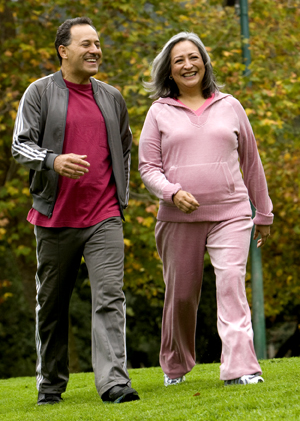Exercising Safely (Cardiovascular)
Exercising Safely
If you feel safe and comfortable while exercising, you are more likely to stick to your exercise program. The guidelines below can help. If you have any questions, be sure to ask your healthcare provider.
Dressing right
Wear loose-fitting clothes. Dress in layers on cool days. That way you can remove a layer if you get too warm.
Always wear shoes that fit well and that are designed for exercise. If you need special orthotic inserts to prevent your feet from hurting, get these before exercising.
When it’s cool outside, wear a hat to retain your body heat.
To protect your eyes and skin from the sun, wear a visor or hat and use sunscreen.
Exercising safely
Exercise indoors when it’s too hot or too cold outside, or when the air quality is poor. Try walking at a shopping mall or walking at a reasonable pace on a treadmill.
Drink plenty of water before, during, and after exercise (unless you are on a water-restricted diet).
Check your pace. You should be able to talk without being out of breath. A good test of the appropriate speed is to see if you can sing; if you can, you may need to increase your pace.
If you use medicine for angina, always carry it with you.
Don’t exercise on days when you are ill or if you forget to take your medicines.
If you have any history of heart problems, be sure to talk to your doctor before beginning an exercise program.
Be sure to warm up before exercising and cool down after. Stretching before and after exercising can help improve flexibility and range of motion in your joints.
Stop exercising and call your doctor if you:
Have chest pain, or if you feel dizzy, lightheaded, or severely weak
Feel burning, tightness, pressure, or heaviness in your chest, neck, shoulders, back, or arms
Have unusual shortness of breath
Have unusual increased joint or muscle pain
Have palpitations or an irregular heartbeat
Updated:
March 21, 2017
Sources:
Elsawy, B. Physical Activity Guidelines for Older Adults. American Family Physician. (2010); 81(1); pp. s55-s59
Reviewed By:
Fetterman, Anne, RN, BSN,Gandelman, Glenn, MD, MPH,Image reviewed by StayWell art team.
